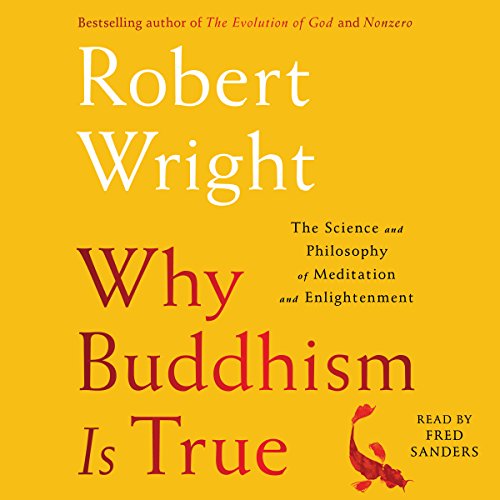
From one of America’s greatest minds, a journey through psychology, philosophy, and lots of meditation to show how Buddhism holds the key to moral clarity and enduring happiness.
Robert Wright famously explained in The Moral Animal how evolution shaped the human brain. The mind is designed to often delude us, he argued, about ourselves and about the world. And it is designed to make happiness hard to sustain.
But if we know our minds are rigged for anxiety, depression, anger, and greed, what do we do? Wright locates the answer in Buddhism, which figured out thousands of years ago what scientists are discovering only now. Buddhism holds that human suffering is a result of not seeing the world clearly – and proposes that seeing the world more clearly, through meditation, will make us better, happier people.
In Why Buddhism Is True, Wright leads listeners on a journey through psychology, philosophy, and a great many silent retreats to show how and why meditation can serve as the foundation for a spiritual life in a secular age. At once excitingly ambitious and wittily accessible, this is the first book to combine evolutionary psychology with cutting-edge neuroscience to defend the radical claims at the heart of Buddhist philosophy. With bracing honesty and fierce wisdom, it will persuade you not just that Buddhism is true – which is to say, a way out of our delusion – but that it can ultimately save us from ourselves, as individuals and as a species.

I’ve been recommending this book to everyone! Why Buddhism is True is a delightfully sly book of self-help for those who consider themselves too smart for self-help, which of course so many of us do. This is truly one of those books you’ll find a reason to recommend to anyone and everyone – because we could all do with a little more happiness in our lives.
Elevated claims For those skeptical of supernatural claims and theistic versions of Buddhism, Robert Wright continues the quest that his earlier books such as The Moral Animal and The Evolution of God began. These titles hint at Wright’s terrain, where fact and speculation, the tangible and the experiential, blur. He explores in Why Buddhism Is True the worldview that in the time of the historical Buddha, could not have been clearly expressed in pre-scientific, and very pre-Darwinian terms to human…
‘The Way’ for ‘The Truth’ of evolutionary psychology As Wright sees it, ‘The Truth’ of the human condition is to be found in natural selection, as described through evolutionary psychology in his early book . And he argues that this truth is uniquely addressed by ‘The Way’ of Buddhism, or at least naturalistic Buddhism. This ‘secular Buddhism’ is Buddhism without reincarnation, spirits or gods…